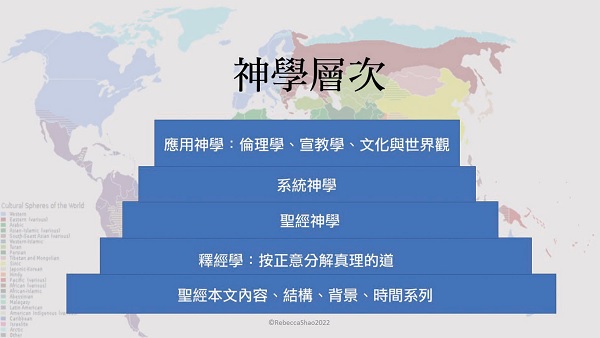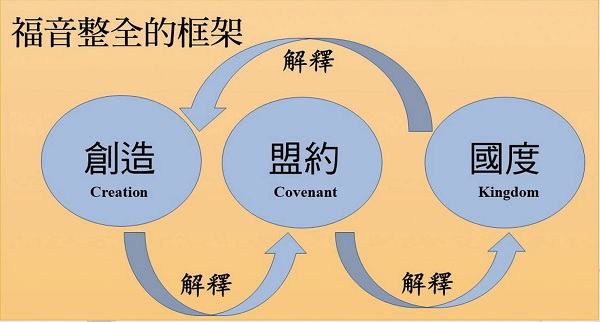Theological Interpretation of Culture
[Interpretation of Pluralist Culture]

Pictures from Yuan:https://www.freepik.com/search?format=search&query=5216358
In the previous article, we considered the response that Christians should have from the challenges of cultural pluralism. This article will take a closer look at how to interpret culture theologically.
theological level
The exploration of theological thinking requires a clear mind and clear insight. Most people read the Bible to understand the events and content recorded in the Bible; theology is a further explanation and requires rigorous training. The understanding of biblical information and the study of theological truths can be divided into five levels. (Picture 1)

Figure 1
1. Content, structure, background, and time series of the Bible text
The first level of understanding the information of the Bible is to understand the content of the Bible text, the structure of the entire book, the background of the book, and how the time of writing is connected with history. It is not only to obtain objective information, but also to understand the cultural background and main propositions of the author at that time. Only by reading the Bible thoroughly and mastering the overall content and the connection between each volume can we understand the profound meaning of God’s revealed message, and only then can we make further interpretation and application. In this era of overflowing information, people's concentration and patience have become very limited. Churches and believers need to be encouraged and reminded to go back to the roots of Bible reading and not just intercept chapters.
2. Hermeneutics that correctly decomposes the truth
Hermeneutics is the correct interpretation of the word of truth; the systematic and regular interpretation of scripture through the consensus standards to which biblical scholars of all ages and contemporary generations have adhered.
Formal training uses the Greek or Hebrew Bible as the primary starting point for interpretation. The Union Bible commonly used by the Chinese was translated from the English King James Version; the earliest English Bible was translated from German; the earliest German Bible was translated from Latin; Latin Version translated from the Greek Bible. Greek has ancient Greek, and ancient Greek is different from the Greek of biblical times. The biblical text that God wrote down so long ago, through His chosen authors, and in the language of the time, is precious. Interpreting the Bible only in Chinese and today's language and cultural background may sometimes seem superficial.
A young scholar specializing in biblical languages, he has studied Aramaic, Papyrus, Greek, Hebrew, Latin, German, and French. When she was identifying biblical texts from the 10th century of the Byzantine era, in order to verify a certain sentence or argument, she had to study many books and interact with many scholars in order to correctly interpret the original text. The results of the research were then left in the commentaries on the Greek version of the Bible that are shared by all scholars around the world. It can be seen that Bible exegesis needs to combine many scholars to contact and study information, so that future generations can have a deeper understanding of God’s words on the basis of accumulation.
From a small window, we can glimpse the vastness of the truth, and we can see that reading, studying, and interpreting the Bible require time and effort. In today's world where speed and convenience are emphasized, hermeneutics has been marginalized. However, without practicing the basic skills of Bible exegesis, it is easy to have deviations in Bible study and preaching.
When believers use Bible commentaries, they need to understand the author's theological position in order to know how the scholar interprets the Bible. Believers must also have insight and discernment. This goes back to the first level of understanding of this article. Otherwise, how can we know the explanatory stance of the author of the commentary? The most important thing in interpreting the Bible is context, which cannot be divorced from the era and cultural background and situation of the time when the text or book was written.
3. Biblical Theology and Systematic Theology
Systematic theology became prominent in the 20th century. Many discussions, such as: Is once saved always saved? Is Jesus Christ God? Or human? How to prove that Jesus is the Son of God? The Trinity is three persons? Or one? These are systematic theology debates.
However, without a foundation in biblical theology, systematic theological debates can lead to biased conclusions that violate the original meaning of the biblical text. Biblical theology refers to finding the coherence of thematic information from the information in the 66 books, constructing a comprehensive blueprint of biblical information, and finding out the themes of the entire Bible.
If the subject information of the Bible is cut into fragments and taken out of context, faith will become fragmented. If these fragments are pieced together into an understanding of God according to people’s preconceived ideas, this is actually weaving an idol. Return to the Bible, survey the entire book, and scan each book to establish a complete and correct biblical theological blueprint, which will become the basis of systematic theology, and then build applied theology.
4. Applied theology that renews the whole person
Ethics, missiology, cultural studies, anthropology, counseling, etc. are all areas of applied theology. We tend to be pragmatic, that is, to pursue solutions. Our interest is in someone telling us what to do, so God's grace is often used as a crutch in life. Principles developed from biblical truth can guide believers to treat others and the world in a way that is in line with God's will on the basis of the truth. However, God’s word not only provides practical methods, but most fundamentally renews the whole person. Without recognizing the true meaning of grace and redemption, only asking believers for forgiveness and peace will limit people’s understanding of the truth and God, and will also create a sense of frustration that they cannot achieve it.
For example, we use deviant gospel information to lead people into the church, but this person does not have a complete understanding and understanding of the nature of the gospel. After a few decades, his journey in the true way may be "missing by a hair or a thousand miles."
Another example of the misuse of applied theology is the once-popular prosperity theology, which advocates that as long as you believe in Jesus, everything will go smoothly and you will be greatly blessed; if you pray to God, God will definitely listen to you. Many believers have understood over the decades that the prosperity gospel is a poison that, if taken when you are in pain, will make you forget the pain. The prosperity gospel leads people away from the essence of the gospel and instead conveys a man-centered message.
Under the influence of humanism, Christianity has unknowingly fallen into individualism, which only cares about the relationship between the individual and God and ignores the overall testimony of the church and the connection between members. If you don't like or agree with the church's programs or practices, just change churches, without caring about the needs of the church as a whole or other members.
When preaching on the application of faith, you may need to reflect: Are you talking about your own reasoning or God’s truth? Do God’s vision and intentions transcend the current situation or problem?
Theological Interpretation of Culture
Studying theology requires a careful examination of the nature of culture. Theological thinking is to evaluate the performance of the world based on the principles of God’s words; interpreting God’s words also attempts to explain world culture. Looking at the ethnic groups we serve from a cultural worldview must involve both biblical and cultural interpretations.
Many people think that theology is metaphysical, abstract and void, and has nothing to do with culture and real life. However, the God we believe in is a real and living God; theology is sufficient and should explain culture.
Contemporary Western culture believes that the framework of belief upheld by the Christian faith must be clearly explained and supported by evidence. The most critical question in the history of theological thought is whether all the belief frameworks used by different peoples to achieve the meaning and value of human life are essentially myths. This was the result of skepticism entering Christianity in the 19th century. Skepticism believes that most of the events and contents recorded in the Bible are fictional myths and myths. But in subsequent theological discussions, many scholars refuted skepticism.

▲Theology is enough to interpret culture; understanding culture helps to understand scripture. Once you understand the historical and religious background of the Roman Empire where the early church was located, you will have a different perspective when you read Acts of the Apostles.
In postmodern times, innovation is emphasized, and being unique and unconventional is considered a virtue, resulting in unprecedented interpretations or discussions of the Bible. The theme message of the Bible remains unchanged, so when you hear such "novel" arguments, you need to pay attention and discern clearly.
God has revealed reality and truth to us in the biblical text. Even if we interpret it from different angles, we cannot create new facts and theories. Believers need to think and interpret culture in a way that is consistent with God’s thinking. For example, when Christianity had not yet become the state religion of Rome, people who believed in Jesus were not accepted by society and were called atheists by the Greeks and Romans. This meant that the group of people who believed in Jesus did not believe in any religion at that time. Socrates died because he challenged the gods that the Greeks generally believed in. If you understand the background of the early church and then read the Acts of the Apostles, you will have a completely different view.
Take the book "The History of the Decline and Fall of the Roman Empire, by Edward Gibbon" written by the 18th-century British historian Gibbon as an example. The author is not a Christian, and his perspective on the decline of the Roman Empire is very different from that of the early church father Augustine, which illustrates the contrast between secular and theological interpretations of cultural history.
Gibbon believed that the collapse and decline of the Roman Empire was due to the destructive power of Christians infiltrating into the Roman Empire. "The City of God" written by Augustine is not only the history of the Roman Empire, but also a Christian philosophy about world history. It provides a thorough theological analysis of the cultural and religious roots of mankind. Augustine believed that the course of human history was a struggle between two cities (or two groups): the "earthly city" (the city of man) and the "heavenly city" (the city of God). Through God’s heavenly revelation, it is known that the city of God will prevail. This is the conclusion drawn from the essence of the Bible. Augustine took God's will as the basic framework of his writings and examined history from God's perspective and thinking. This is what today's believers need to learn.
The following are the interpretations of culture by several well-known scholars of the 20th century:
◈Abraham Kuyper (1837-1920)
This Dutch Reformed Calvinist theologian advocated that "Christ has a dominant position in all areas of human life. Culture is not some neutral, non-theological activity, but an existing religious activity." Any ethnic culture is different. There is a belief framework of a religious nature, otherwise it will not become a culture. He added:"The dichotomy between the sacred and the secular is false. Two worldviews and outlooks on life are engaged in a desperate struggle. The secular worldview and the biblical worldview, the former constructs its worldview on the basis of naturalistic principles, the latter constructs its worldview on Christian principles Worldview."
Naturalism refers to the external world that is based on seeing. People have no soul after death and there is no other world. The Bible teaches that all people are priests, and there should be no distinction between sacred and secular; no work is absolutely sacred, and no activity is completely secular. Christians are people of God, and everything in their lives belongs to God. After believing in the Lord and committing themselves to the Lord, all aspects of life, including cooking and buying groceries, church service, interpersonal interactions in the workplace, etc., including daily necessities, rice, oil, salt, soy sauce, vinegar, and tea, must be surrendered. Under the sovereignty of God, we all live in the presence of the Lord. This kind of message should also be conveyed when preaching the gospel, so as not to cause compartmentalization. If you follow the unbelievers at work, you will behave godly in the church.
Kuiper put forward a very important concept: as long as one belongs to the Lord, all areas of life belong to God. Psalm 1 clearly distinguishes the way of the righteous from the way of the wicked. Two world views and outlooks on life have been colliding within believers. There will definitely be many challenges, temptations, temptations, traps, and struggles in the Pilgrim's Progress. Knowing the truth can help us choose to keep running towards the right goal.
◈Herman Dooyeweerd (1894- 1977)
The Dutch philosopher believed that the roots of culture are religious and that every culture is driven by fundamental religious motives. In the past, a certain group of people or a certain culture worshiped a certain god, such as the sun god or the moon god, and the corresponding culture was derived from this religious action. Fundamental motivation refers to the basic direction of personal or social life. Motivation brings motivation, and motivation brings energy, driving forward in one direction. The source of energy and direction is the human heart. The motivation for behavior comes from the heart. Du Yiwei clearly stated that every culture is driven by the fundamental motivation of affirming God or denying God.
◈Paul Tillich (1886-1965)
This influential German-American theologian agreed with Kuiper and Du Yiwei that culture is essentially religious. Being human is essentially a religious experiment, but humanity is threatened in three main ways: death, guilt, and pointless anxiety. Everyone is mortal; guilt makes people feel that they will never meet God's standards, they don't know if they will be accepted by God, they don't know if they are good enough, and whether they are doing the right thing. The third threat is that there is no meaning in living. I eat three meals a day and then go to bed. I get up and eat three meals a day and then go to bed again. There is no goal and no meaning. These three types of anxiety make people feel insecure. Tillich's explanation of the human condition and human culture is ontological or existential. He believes that religion is the essence of culture and culture is the form of religion.
One of his often quoted words is: "Whoever can understand the style of a culture can discover its ultimate concern, its religious essence." For example, Chinese culture emphasizes pragmatism, so the ultimate concern of Chinese people is mostly this life. Blessed, smooth and prosperous, safe, blessed, and full of children and grandchildren, these are real, tangible, and concrete blessings.
◈Karl Barth (1886-1968)
This Swiss theologian had a profound influence. He considered the world to be the realm of God's redemptive activity, not the source. While human culture can be influenced by God's commands and God's promises, God's kingdom will always transcend human achievements. This sentence denies the so-called man's victory over nature. Christians cannot ignore the Kingdom of God in their thinking; the Kingdom of God must far exceed the achievements of man and the church. Believers need to know what God truly cares about, and the church needs to be a humble witness to God’s kingdom, not just an administrator.
The holistic framework of the gospel
The message that runs through the entire Bible is the overall framework of the gospel, which includes the three elements of creation, covenant, and kingdom. (Figure II)

Figure II
When many believers preach the gospel, they only focus on the work of Jesus Christ. However, the Holy Trinity of Father, Son, and Holy Spirit has the same dignity, glory, and time, and is constantly transforming. What we believe in is the God of creation. He is the Lord who created the universe, heaven, earth, all things, and humans, and He reveals Himself as the Triune God in creation. When facing people who have never been exposed to the Christian faith, you can start by preaching about creation.
The second aspect of the whole gospel is covenant. Christ died for us on the cross, resurrected after death, ascended to heaven, sits at the right hand of the throne of God the Father, and constantly prays for all saints. This is a covenant relationship. Jesus brought the covenant between God and man into reality through the work of Christ and the descent of the Holy Spirit into people's hearts.
The third is the kingdom of God. Believers need to have the vision to see God's ongoing work throughout the kingdom. Theology is the overall framework for interpreting the gospel: the covenant is explained through creation; the kingdom is explained through covenant; and creation is reinterpreted through the kingdom. Connecting the three elements through explanation is the complete framework of the gospel.
After understanding theological interpretation of culture and the framework of the whole gospel, in the next article, we will look at how God’s people transcend multi-cultural situations from the Old and New Testaments.
Questions to think about:
• What do you know about theology? At what level are you challenged? How can we break through?
• How do you interpret your culture theologically? Do you think you are influenced by culture or influence culture?
• What do you understand about the three elements of the holistic gospel framework? How to bring these three elements into your evangelism?
Bibliography and sources:
• Carson, DA, and John D. Woodbridge, ed. God and Culture. Grand Rapids, MI: Eerdmans Publishing, 1993.
• Larkin, William, and David Cashin. Culture and Worldview Course Curriculum. CIU, 2006.
• Sire, James W. The Universe Next Door: A Basic Worldview Catalog. Downers Grove, IL: IVP Academic, 2004.
• Smart, Ninian. Worldviews: Crosscultural Explorations of Human Beliefs. Upper Saddle River, NJ: Prentice Hall, 2000.
• Vanhoozer, Kevin J. “The World Well Staged? Theology, Culture, and Hermeneutics,” in God and Culture.
Mrs. Shao Wensi, currently pastoring a church with her husband and pursuing a PhD in theological studies; she has worked in professional business management, finance and taxation, and computer communications. While educating his children at home, he completed a Master of Divinity; he has devoted himself to theological education, home education, marriage and family ministry, discipleship training, Bible teaching, Eurasian missions and church planting, and preacher training. They have three adult sons, one daughter, and four grandchildren.
